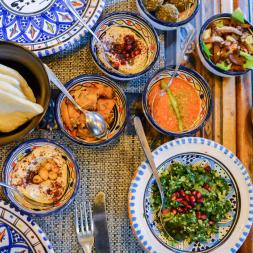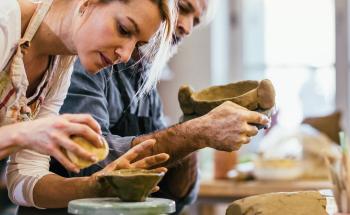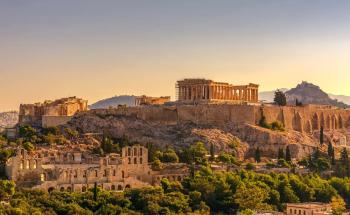
Third-party on-site course
Thessaloniki - Tastes and Cultures: Working Towards Inclusive Education While Exploring the City's History
Thessaloniki was influenced by different cultures around the Mediterranean with each leaving their own distinct mark on the city. While architecture is often easiest to see, it is the foods as well as music, dress and social conventions that gives us a richer window with which to understand the city's cultures better. Join us for this new course and discover this unique city's treasures.
08.04.2024
Next upcoming session:
28.10.2024
- 02.11.2024
Greece
,
Κεντρική Μακεδονία
,
Thessaloniki
Description
In 2022 Thessaloniki became the first Greek city to join UNESCO’s Creative Cities Network for gastronomy by recognizing its traditional culinary practices, vibrant gastronomical community, and local foods, among others. Gastronomy has deep roots in this part of the world and when brought to light it spreads through the traditions, cultures and even music of the times. Ancient Greek culture can still be traced in today’s modern dishes and many more followed, with Roman, Ottoman, Jewish, Norman, Slav, and Arab, each leaving a unique gift to the city’s cuisine while shaping its identity and culture.
In this course we walk through the city’s history and look at its food and dishes. We dive back into ancient Greek antiquity, moving on through the hellenistic, roman, byzantine, ottoman and finally reaching the modern day history of the city. We focus on the gastronomy: what are its origins, how were people eating, what was the social concept of dining and having their coffee together, how were they preparing the food, what are the different cultures that met here, how does the modern day cuisine reflect all this cultural heritage, etc. Also, how does modern day gastronomy affect and is affected by climate change? How can it be more eco-friendly? Finally, can gastronomy help us become more responsible citizens and more empathetic persons?
As you can understand, gastronomy is only the start of our 6 day journey in time and cultures. Teachers who will participate in our course will have the opportunity to learn about the cultural heritage of the past but also get a better understanding of present day history and culture. They will study multiculturalism and find out how this is reflected on our eating habits and attitudes in general. And as expected we will look at what is required to foster a culture that values diversity, inclusivity, while promoting respect, empathy and understanding in the classroom and society at large.
Learning objectives
- will present the theoretical framework of history of food in ancient Greece and the value of nutrition
- will meet the best teaching practices that promote free thinking and expressing oneself
- will have outdoor education opportunities
- we will look at inclusiveness in the classroom
- will visit wineries, farms, cafes, restaurants and other places liked to the city’s gastronomy
Methodology & assessment
Food and nutrition | Educational visits | Experiential learning and teaching | Group work | Challenged based learning and teaching | Group work | Workshops | Presentation | Evaluation
Certification details
Certificate of course completion provided to attendees who meet all objectives
Pricing, packages and other information
-
Price:480Euro
-
Package contents:Course
Additional information
-
Language:English
-
Target audience ISCED:Primary education (ISCED 1)Lower secondary education (ISCED 2)Upper secondary education (ISCED 3)
-
Target audience type:Head Teacher / PrincipalTeacherTeacher Educator
-
Learning time:25 hours or more
Upcoming sessions
More courses by this organiser

Organisation picture
Organised by
Level Up Creative Educational Labs

On-site
Democracy: Titans and Tyrants of Greece’s Past and a Journey Towards Modern Europe
Next upcoming session
-
Athens
,
Greece
Organisation picture
Organised by
Level Up Creative Educational Labs

On-site
Story-building and Creative Writing: How to Empower Students to Write
Next upcoming session
-
Multiple locations
Organisation picture
Organised by
Level Up Creative Educational Labs

